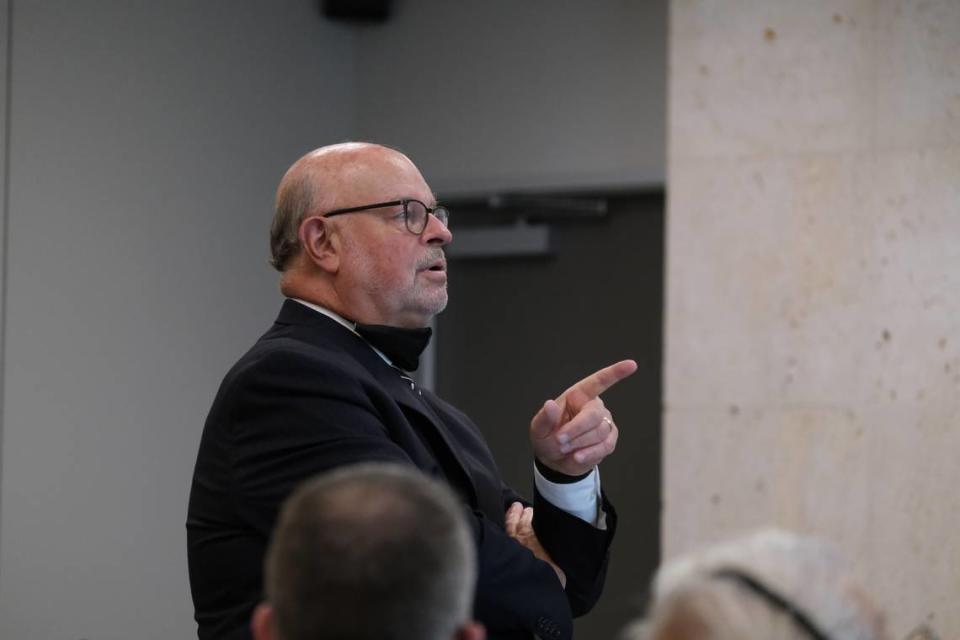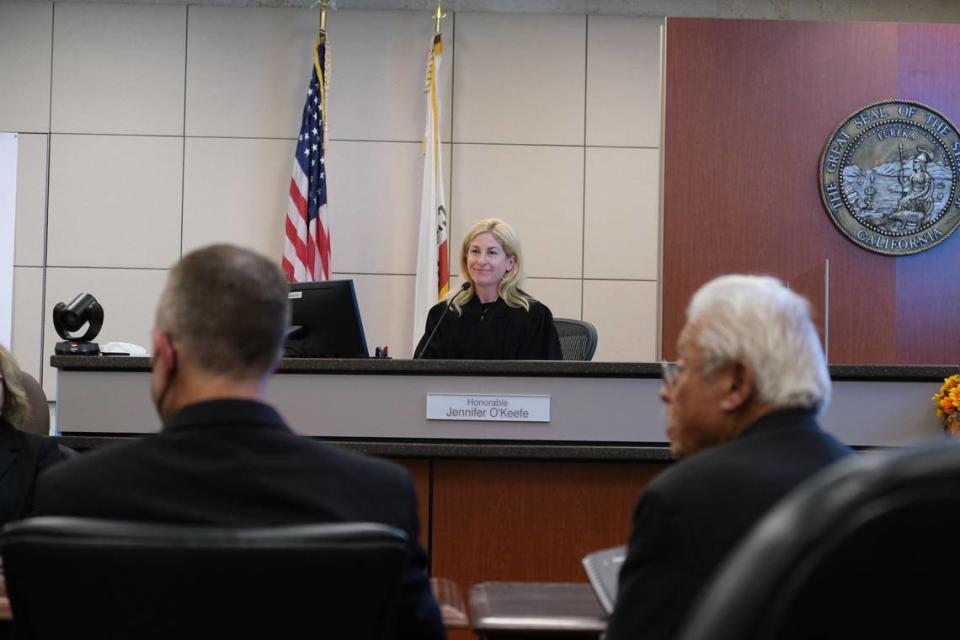Closing statements in Kristin Smart murder trial to begin next week. Here’s what to expect
Closing arguments in the Kristin Smart murder trial will take place Monday and Tuesday, Monterey County Superior Court Judge Jennifer O’Keefe announced Thursday.
Paul Flores is accused of killing the Cal Poly student and hiding her body with the help of his father, Ruben Flores.
Jurors will hear closing statements in the case against Paul Flores on Monday in Monterey County Superior Court in Salinas, while a separate jury will hear closing arguments in the case of Ruben Flores on Tuesday.
Court proceedings on Thursday were delayed for three hours due to concerns about a juror on Paul Flores’ jury who has a home improvement-inspired Pinterest board that “delved into topics in the case,” O’Keefe said.
The board includes tips on septic tanks, how to test soil pH without a kit and how to remove tree stumps.
The juror said she hasn’t visited the social media site since 2020 and that the board was created because the house she bought had a septic system and needed to be remodeled. She added she had intentionally gone out of her way to not look up any details of the Smart case and shut down conversations about it if they came up.
O’Keefe ruled the juror’s explanation checked out, and they were able to stay on the jury.
Prosecution calls soil expert to stand for rebuttal
Following the delay, the prosecution called Angela Butler, senior forensic DNA analyst for the Serological Research Institute in Richmond, to the stand around 2 p.m. Thursday in a rebuttal.
San Luis Obispo County Deputy District Attorney Chris Peuvrelle was seeking to clarify her testimony regarding the test used on the soil samples underneath Ruben Flores’ house.
Paul Flores’ defense attorney, Robert Sanger, objected four times during Butler’s testimony, saying that her testimony did not meet the criteria for a rebuttal witness.
The prosecution can only call new witnesses or new evidence during a rebuttal to respond to the defense’s case.
Butler spoke on the stand about soil samples the San Luis Obispo County Sheriff’s Office sent to her lab for analysis as part of its investigation of the Smart case.
Butler testified that she wasn’t concerned or surprised that tests on sub-samples from the same container of soil samples sent to her from the San Luis Obispo County Sheriff’s Office had different results — refuting a claim by defense witness Elizabeth Johnson, a forensic DNA consultant who said the tests are not reliable because of the discrepancy.
Butler said she specifically chose sub-samples of interest based on color, texture, fibers or other features, noting that it’s not unusual to yield different results between each sub-sample.
Butler also noted that the difference between a positive result and a weak positive result is something only her lab distinguishes.
The manufacturer that makes the test says any indication in the test line of the test is positive, Butler said.
The Serological Research Institute has conducted its own experiments testing blood stored on cloths dating back to the 1970s, ’80s and ’90s, Butler said.
The blood still yielded positive results decades later, she said.
But the test was not done on aged blood buried four feet down in soil, Ruben Flores’ defense attorney, Harold Mesick, pointed out.

Sanger focused on the number of negative results yielded from Butler’s tests.
“It has nothing to do about weighing positives or negatives,” Butler said, adding that a positive test is a positive test.
“I don’t think you understand the way sampling works with the test,” Butler told Sanger.
“Anything’s possible,” Sanger responded.
Speaking about a study on blood exposed to the elements over time, Butler said she has some questions as a scientist regarding its results and methodology.
For example, the test did not disclose how much blood was used in the tested samples, so one of Butler’s questions is whether scientists who conducted the study used up all the samples over the weeks of testing.
“(The study) isn’t peer-reviewed at all and wasn’t subject to rigorous questioning by scientists,” Butler said.
Sanger pointed out that her labs study on the old blood was also not peer-reviewed.
Butler was excused after about an hour of testimony. She was the prosecution’s only rebuttal witness.

How will the verdict work?
Next week, each jury will attend closing statements separately, O’Keefe said.
Immediately after closing statements, jurors will head to the deliberation room. If the statements last until the end of the court day, then the jurors will come back the next day to deliberate.
Whichever jury finishes first will seal its decision and give it to the court clerk. The jurors are not to speak about the case or reveal the verdict to anyone, the judge said.
When the second jury reaches its verdict, the first jury is expected to be available to get to the courthouse within 40 minutes. Each verdict will be read separately.
After both verdicts are read, jurors will be released from the rules to which they’ve had to adhere during the trial. They will be allowed to talk about the Smart case, consume media and make public statements.

